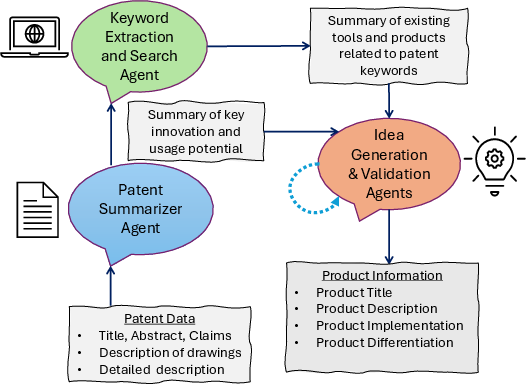- The paper introduces Agent Ideate, a framework that leverages multi-agent LLM workflows to extract and generate innovative product ideas from patents.
- It details methodologies including prompt-based LLMs, a modular agent architecture without tools, and an enhanced version with external search to handle diverse technical domains.
- The evaluation shows that enriched external data significantly improves idea quality, while highlighting performance variances and domain-specific challenges.
Agent Ideate: A Framework for Product Idea Generation from Patents Using Agentic AI
Introduction
"Agent Ideate: A Framework for Product Idea Generation from Patents Using Agentic AI" addresses the challenge of harnessing the technical knowledge embedded in patent documents to inspire innovative product ideas. The methodology, built upon LLMs and autonomous agents, provides a structured approach to extracting and generating insightful business concepts from patents across domains such as Computer Science, Natural Language Processing, and Material Chemistry.
Methodology
This paper proposes the Agent Ideate framework which utilizes agentic AI workflows for product ideation. The approach consists of three methodologies:
- Prompt-based LLM: This uses a single-prompt method where the patent's reduced components are processed by an LLM to generate ideas in a structured format. While straightforward, this approach demonstrates limitations in generating quality ideas due to lack of context and detailed analysis.
- Multi-Agent LLM Architecture: Enhances the process by modularizing tasks across specialized agents:
- Patent Analyst Agent: Extracts key technological insights from patents.
- Business Idea Generator Agent: Develops structured business concepts from those insights.
- Business Validator Agent: Validates and ensures originality and compliance with constraints.
This architecture, referred to as "Agent without Tool," facilitates better handling of complex tasks by breaking them into manageable parts.

Figure 1: Illustration of the Agent Ideate Pipeline.
- Multi-Agent LLM with External Search Tool: The most sophisticated method, this incorporates an external web search tool to gather domain-relevant information:
- Keyword Extractor Agent
- Research Agent uses DuckDuckGo tool for domain insights
- This augmented setup, termed "Agent with Tool," provides deeper contextual data for business idea differentiation.
Experiments and Evaluation
The paper conducted experiments using various approaches, employing prompt-based, agent without Tool, and agent with Tool frameworks. Evaluation utilized both automated LLM-as-a-judge and human expert methods. Notably, the Agent with Tool approach showed superior quality in ideas for Computer Science domains, while standalone agent methods excelled in NLP. Findings from comparisons across the setups indicate that agentic architectures significantly enhance the ideation process, particularly when enriched with external data.
Discussion
The results reveal domain-specific strengths and weaknesses, showcasing the agentic method's potential for structured innovation and the challenges of variability in LLM effectiveness across different areas. Human evaluations reinforced these findings, particularly in Material Chemistry, where creative ingenuity led to high innovation rankings but questioned feasibility, highlighting the necessity for robust domain adaptation and hybrid evaluation.
Conclusion
The Agent Ideate framework represents a significant step toward leveraging patents for business ideation, demonstrating the effectiveness of agentic AI in augmenting the innovation pipeline. While promising, this paper underlines domain-specific constraints and motivates further exploration into hybrid approaches for maximizing ideation potential across disciplines.
Limitations
Identified limitations include reliance on open-source LLMs that might not meet proprietary model performance and significant variance in effectiveness across domains. Moreover, introducing external search tools constitutes potential information noise, requiring improved integration and adaptive techniques. Future research should focus on refining domain-specific models, enhancing evaluation methodologies, and incorporating robust agent tool integrations.
